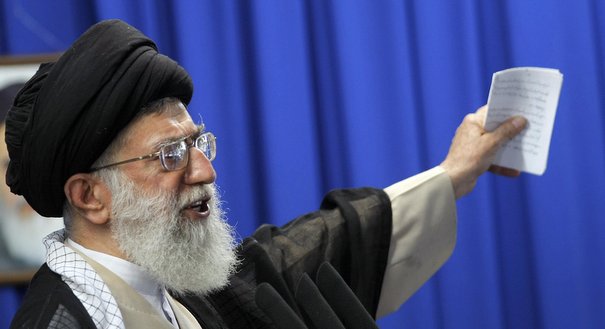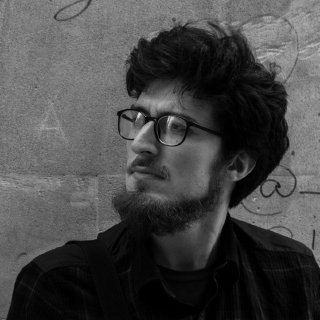Baku may allow radical nationalists to publicly discuss “reunification” with Azeri Iranians, but the president and key officials prefer not to comment publicly on the protests in Iran.
Bashir Kitachaev
{
"authors": [
"Karim Sadjadpour"
],
"type": "legacyinthemedia",
"centerAffiliationAll": "",
"centers": [
"Carnegie Endowment for International Peace"
],
"collections": [],
"englishNewsletterAll": "",
"nonEnglishNewsletterAll": "",
"primaryCenter": "Carnegie Endowment for International Peace",
"programAffiliation": "",
"programs": [
"Middle East"
],
"projects": [],
"regions": [
"Middle East",
"Iran"
],
"topics": [
"Political Reform"
]
}
As protests of unprecedented scale continue across Iran and the sense of outrage mounts, Supreme Leader Ayatollah Khamenei's authority is being questioned for the first time. Something truly historic is afoot in Iran.
Source: Council on Foreign Relations

I truly think something historic is afoot today in Iran. The scale of the protests is unprecedented. The depth of people's sense of injustice and rage is palpable. People are continuing to bravely take to the streets, risking their lives, despite the fact that they've been told the Basij and Revolutionary Guards have been authorized to use force. This has not dissuaded them. The fissures we're seeing amongst revolutionary elites are also unprecedented. It's very difficult to see how the status quo ante could prevail no matter what happens.
The Supreme Leader’s decision to delegate responsibility to the Guardian Council was classic Khamenei in the sense that he doesn't cede authority—the Guardian Council is essentially under his jurisdiction—but he buys time and deflects accountability. He was calculating that if he could buy time, the scale of these protests would gradually diminish. So far, that hasn't been the case. He may eventually be faced with a situation of whether to sacrifice President Mahmoud Ahmadinejad, whose "re-election" he announced, or go down himself with the ship.
Khamenei has in many ways become a modern day Shah, with a turban instead of a crown.
Some people have speculated, including Professor Arang Keshavarzian, that perhaps Ahmadinejad is running the show and Khamenei is just going along. Do you think that's at all possible?
I don't think that's plausible. If it were, Ahmadinejad certainly wouldn't have gone on an official visit to Russia. He would have stayed in Tehran and directed things. By all accounts, anyone whom you talk to amongst the political elites in Tehran will tell you that Khamenei had become more powerful than he's ever been in his twenty year tenure as Leader. If you look at the Islamic Republic's most powerful institutions—the Guardian Council, Parliament, the Presidency, the Revolutionary Guards—are all currently led by individuals who are either directly appointed by Khamenei or unfailingly obsequious to him. Khamenei has in many ways become a modern day Shah, with a turban instead of a crown. But I believe he miscalculated. This election, or I should say this "selection," was an insult to people's intelligence. Political, economic, and social malaise had been brewing for many years and this "selection" was for many people the last straw.
You mentioned a little earlier that Khamenei might "go down with the ship." What does that mean?
Previously sacred red lines in Iran are now being challenged. People are now beginning to openly question the institution of the velayet-e faqih, or the rule of the jurist, which is the Khomeinist system of governance that was implemented in 1979. It is unprecedented that people would begin to openly challenge Khamenei's legitimacy as Supreme Leader, and indeed question the legitimacy of the institution of the Supreme Leader. There are widespread reports that Hashemi Rafsanjani, Khamenei's kingmaker, is trying to assemble a coalition of Grand Ayatollahs in Qom against Khamenei. Rafsanjani is head of the Assembly of Experts, a body that has the constitutional authority to anoint and remove the Supreme Leader.
It is unprecedented that people would begin to openly challenge Khamenei's legitimacy as Supreme Leader, and indeed question the legitimacy of the institution of the Supreme Leader.
Ayatollah Montazeri—who was Ayatollah Khomeini's former heir apparent, a genuine Grand Ayatollah, not someone who had mid-ranking credentials and was made an Ayatollah overnight like Khamenei—has openly challenged both this election and Khamenei’s reign.
People are not calling for a wholesale revolution as they were in 1979. I’m not hearing the word “enqelab,” i.e. revolution, mentioned by the protestors. There exists a political maturity now that didn’t exist then. People don't have the same naïve, utopian dreams that they had in 1979. They want a system that is representative of the people. I think many people believe that the Islamic Republic does have important institutions, such as the institution of the presidency and parliament. But what they want to see is the unelected institutions, which currently have the majority of the constitutional authority, to be either removed or their authority seriously limited.
That's a big order. These are the people who have the guns right now. How do you get them out of power?
We shouldn’t view the clergy or the Revolutionary Guards as monolithic entities. It's true that the senior commanders in the Revolutionary Guard were handpicked by Khamenei, and they're going to remain unfailingly loyal to him. But the Revolutionary Guards are a huge group—over 120,000 men. I used to occasionally meet with some of them when I was based in Iran, and I think many of them understand that this "death to America" culture of 1979 is obsolete in 2009. Many among the rank and file were widely thought to have supported Mohammad Khatami's presidency. If the Revolutionary Guards are ordered to massively clamp down on the Iranian people—men, women, children—I'm not sure that they'll remain intact. I believe there are real fissures among them. Mohsen Rezaie was the longest serving senior commander of the Revolutionary Guard and has voiced opposition to Ahmadinejad's election. Mohammed Bagher Ghalibaf, former senior Revolutionary Guard commander and current mayor of Tehran, is one of Ahmadinejad's archrivals. So we shouldn't see the Revolutionary Guards as simply 120,000 crazed Khamenei devotees willing to martyr themselves to retain Ahmadinejad's presidency.
Khamenei has long believed that when you're under pressure, you should never compromise.
What sequence of events has to happen? Does Ahmadinejad have to be forced to resign? Does Khamenei have to resign? How do you do this without massive bloodshed?
It's important to try and understand the world-view of Ali Khamenei. Khamenei has long believed that when you're under pressure, you should never compromise. Compromise projects weakness and will invite even more pressure. This is the way he approaches foreign relations, and this is the way he approaches domestic policy as well. And incidentally this was the lesson that many Islamic Republic political elites learned from the 1970's during revolts against the Shah. They believe that when the Shah started to acknowledge people's discontents—when he famously said "I've heard your revolution"—he thought that was going to pacify the protestors. On the contrary, that's when the revolutionaries smelled blood and pounced. Khamenei is in a very delicate position, because he believes that if he compromises too much it could project weakness and invite even more protests. At the same time if he refuses to compromise at all, he may face his own demise for the sake of saving a very unpopular president in an election that is widely seen as fraudulent.
Can he make a deal with the Mousavi forces?
The dilemma that Khamenei faces is that if Mousavi becomes president, he's not going to be a subordinate president like Ahmadinejad is and like Khatami was. In the 1980s, Mousavi was prime minister when Khamenei was president, and he was widely thought to have been more influential and powerful than Khamenei was. It's widely known, despite the fact that they are relatives, that they have a very contentious relationship. Given what transpired over the last two weeks, I think Khamenei has lost enormous political capital with the Iranian public. He's lost enormous political capital with the Iranian political elite. He's going to have to calculate whether he wants to save Ahmadinejad's presidency at all costs in order to have a subordinate president who's not going to challenge him, or whether he's willing to compromise by accepting a Mousavi presidency and a potentially much more limited political role for himself.
The dilemma that Khamenei faces is that if Mousavi becomes president, he's not going to be a subordinate president like Ahmadinejad is and like Khatami was.
That would be an incredible turnabout. He'd have to have the election committee decree that it was a whole fraud. How would he do this?
Khamenei's modus operandi is to wield power without accountability. This is how he's ruled the last twenty years. Because the president of Iran has such a high profile both domestically and internationally, when thing aren't going well in Iran—and they usually aren't going well in terms of economic malaise, political restrictions, and social restrictions—the president usually bears the brunt. If you do a Google search for Ahmadinejad, ten more million hits come up than a Google search for Khamenei. But in reality, he holds the vast majority of constitutional authority. If a decision is made to either annul the election or overturn the results, he'll have the Guardian Council do it even though the Guardian Council is under his jurisdiction. That'll be another way to try to deflect accountability and project himself as a magnanimous leader staying above the fray.
A sense of time now: do you think this will go on before another week before such a decision is made? Does it require the people to face continous threats and everything else to go out on the streets?
People are paying an enormous cost for this. I have to say that I have tremendous admiration for the bravery of these people, not just in Tehran but throughout the country. They're risking their lives everyday for a very simple request: a greater political voice to rectify the profound sense of injustice they’re feeling. What we saw in the 1979 revolution was that when the Shah’s government clamped down and began killing people, the protests actually mushroomed and the scale of the demonstrations increased.
One important distinction between the Shah's regime and the current regime is that many of the political, military, and intelligence elite of the Shah’s era had alternative options when the going got tough. Many were educated in the United States and Europe and could subsist outside of Iran. But for the Islamic Republic’s political and military elite, Iran is all that they have. They weren't educated in Europe, their formative years were in the seminaries of Qom and in the battlefield against Iraq. I think they have always known that if they want to stay in power, there are going to be times when they have to use force. But again, having themselves been on the other side of history in the late-1970's, they're cognizant of the fact that if the force isn't properly calibrated, it could augment their vulnerabilities rather than their security.
If we try to insert ourselves into the momentous internal Iranian drama that’s unfolding we may unwittingly undermine those whom we’re trying to strengthen.
Given your analysis, what should the Obama administration do? Should it keep hands off rhetorically or should Obama condemn the efforts of the Iranian authorities to crack down? Should it call for a new election?
This is extremely delicate and the situation is so dynamic. We clearly have to be on the right side of history here, but I think if we try to insert ourselves into the momentous internal Iranian drama that’s unfolding we may unwittingly undermine those whom we’re trying to strengthen. Historically that’s often been the case in Iran.
It goes without saying that the Obama administration should clearly not acknowledge the results of these contested elections. This would demoralize people. We should also be pushing all of our allies not to acknowledge the results of these elections until justice prevails in Tehran. I was disappointed that Turkey’s Abdullah Gul and Afghanistan’s Hamid Karzai did not hesitate to congratulate Ahmadinejad.
But again, I think if we overtly take sides the regime could well react with a massive and bloody crackdown on the demonstrators using the pretext that they are acting against an American-led coup. And the sad thing is that much of the global media would focus more on what Obama said than what the Iranian government did.
That said, I do think the President should condemn the flagrant violence against innocent civilians, including women and the elderly. The Iranian regime likes to talk a lot about justice, and we should make it clear we want to see justice and the will of the Iranian people prevail.
In light of Khamenei’s firm speech Friday indicating he was not going to support a new election, what do you think will happen? Do you think the opposition will have to retreat?
First, it was expected that Khamenei’s first response would be very firm, that’s his modus operandi as a despot: Never compromise in the face of pressure, it only projects weakness and invites more pressure.
Khamenei is a shrewder politician than Ahmadinjedad. Whereas Ahmadinejad has a penchant for alienating even hardliners, Khamenei reached out and for now seemingly co-opted some of those that seemed to be previously sitting on the fence, namely Speaker of the parliament Ali Larijani and Mohsen Rezai, both of whom are tremendous opportunists.
The weight of the world now rests on the shoulders of Mir Hossein Mousavi.
The weight of the world now rests on the shoulders of Mir Hossein Mousavi. I expect that Khamenei’s people have privately sent signals to him that they’re ready for a bloodbath, they’re prepared to use overwhelming force to crush this, and is he willing to lead the people in the streets to slaughter?
Mousavi is not Khomeini, and Khamenei is not the Shah. Meaning, Khomeini would not hesitate to lead his followers to “martyrdom”, and the Shah did not have the stomach for mass bloodshed. This time the religious zealots are the ones holding power.
The anger and the rage and sense of injustice people feel will not subside anytime soon, but if Mousavi concedes defeat he will demoralize millions of people. At the moment the demonstrations really have no other leadership. It’s become a symbiotic relationship, Mousavi feeds off people’s support, and the popular support allows Mousavi the political capital to remain defiant. So Mousavi truly has some agonizing decisions to make.
Rafsanjani’s role also remains critical. Can he co-opt disaffected revolutionary elites to undermine Khamenei? As Khamenei said, they’ve known each other for 52 years, when they were young apostles of Ayatollah Khomeini. I expect that Khamenei’s people have told Rafsanjani that if he continues to agitate against Khamenei behind the scenes, he and his family will be either imprisoned or killed, and that the people of Iran are unlikely to weep for the corrupt Rafsanjani family.
Whatever happens, and I know I shouldn’t be saying this as an analyst, but my eyes well when I think of the tremendous bravery and fortitude of the Iranian people. They deserve a much better regime than the one they have.
Carnegie does not take institutional positions on public policy issues; the views represented herein are those of the author(s) and do not necessarily reflect the views of Carnegie, its staff, or its trustees.
Baku may allow radical nationalists to publicly discuss “reunification” with Azeri Iranians, but the president and key officials prefer not to comment publicly on the protests in Iran.

Bashir Kitachaev
The story of a has-been politician apparently caught red-handed is intersecting with the larger forces at work in the Ukrainian parliament.

Konstantin Skorkin
This time, though, they’re adding even more pressure to an already beleaguered regime.

Eric Lob
The country’s leadership is increasingly uneasy about multiple challenges from the Levant to the South Caucasus.

Armenak Tokmajyan
It’s one thing to export Russian helicopters to Iran to fight the insurgency, and it’s easy to imagine Moscow becoming a haven for fleeing Iranian leaders. But it’s very difficult to imagine Russian troops defending the Iranian regime on the ground.

Nikita Smagin